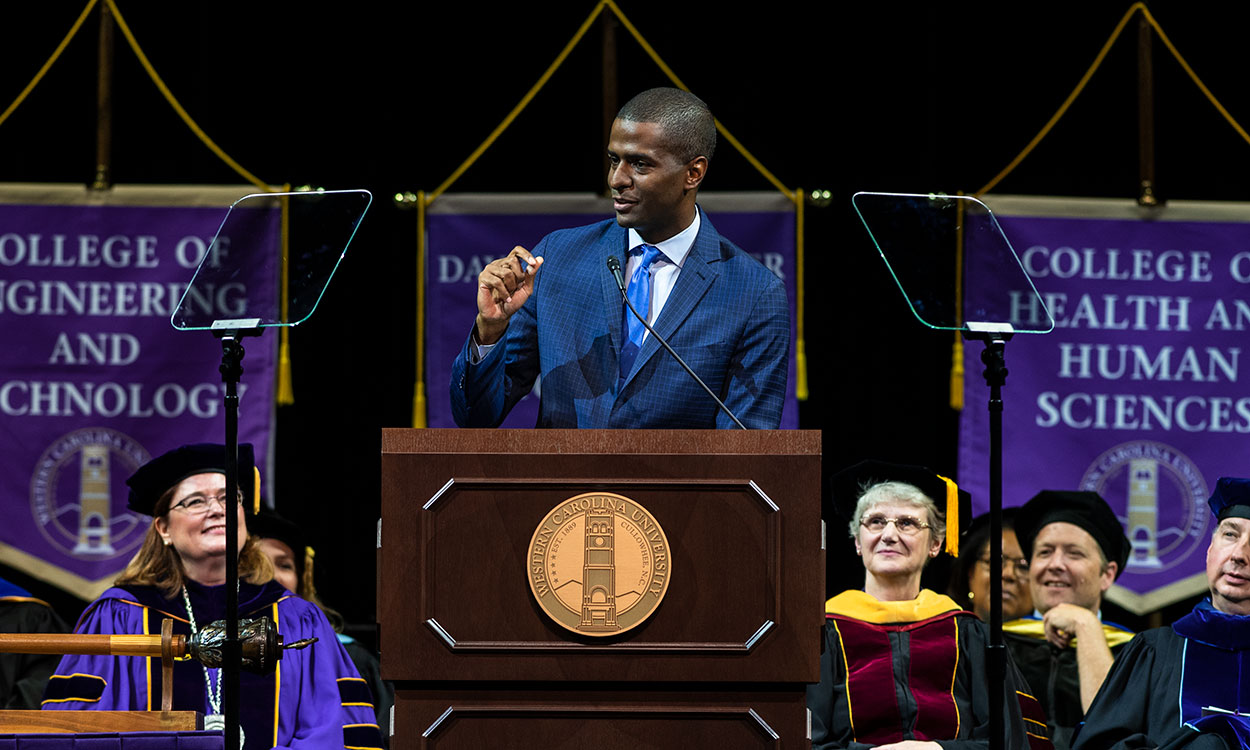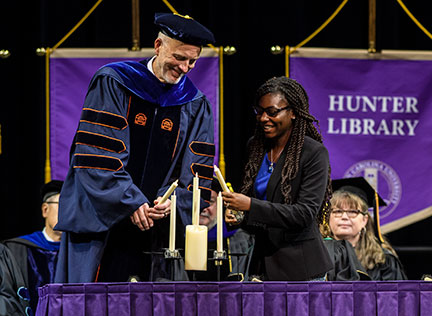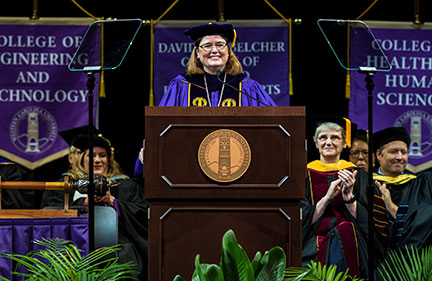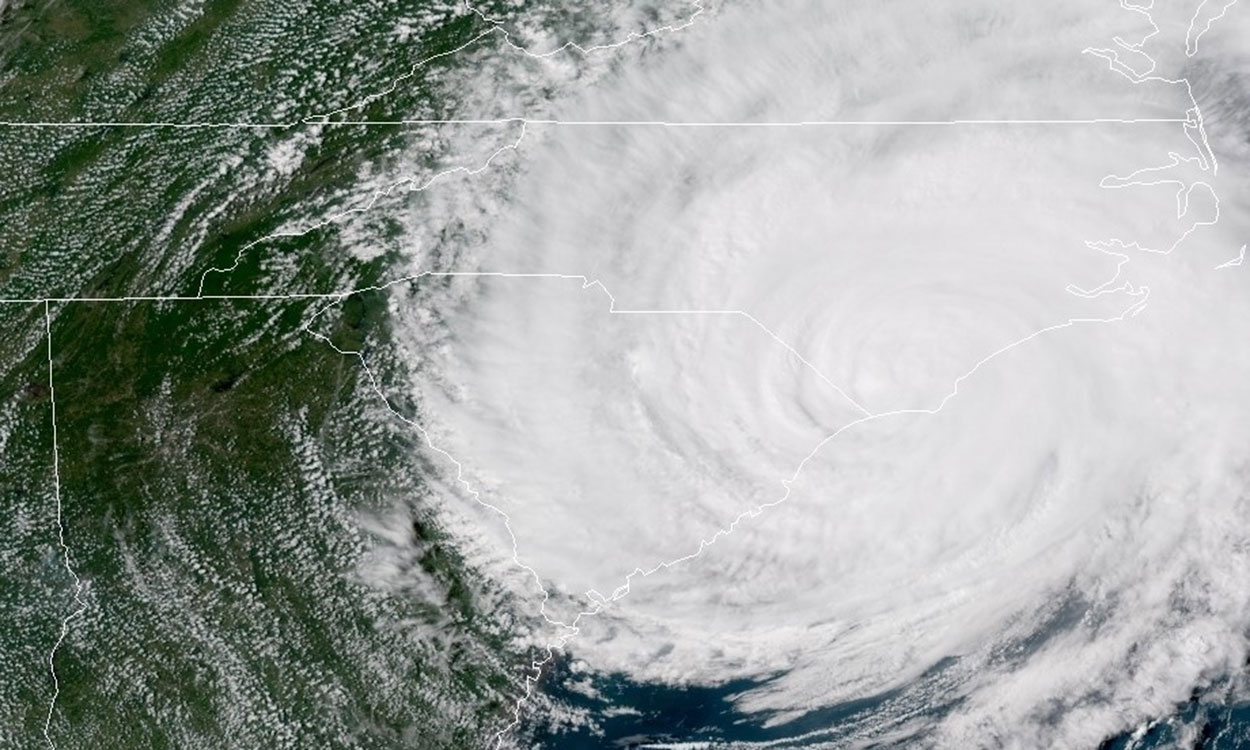Bakari Sellers tells students at convocation: 'Love your neighbors' and 'dream with your eyes open'

Bakari Sellers speaks to an audience of freshmen and new transfer students at WCU's New Student Convocation.
A former South Carolina state legislator who is among the youngest African-Americans to ever hold office in the U.S. had two pieces of advice for Western Carolina University’s newest students when he spoke at the university’s annual New Student Convocation: “Love your neighbors even when they don’t love you,” and “dream with your eyes open.”
Bakari Sellers, an attorney and political analyst, made history in 2006 when he was elected to the South Carolina Legislature as a 22-year-old. Sellers told WCU’s freshmen and new transfer students at the Aug. 16 event in Ramsey Regional Activity Center that they are each on a personal journey in pursuit of “nothing less than excellence.” And, on any journey, the first question that must be asked is, “How far have we come,” and the second question is, “Where do we go from here?” he said.
Sellers spoke to the students about heroes and heroines of the civil rights movement whose actions occurred near the area where he was raised in central South Carolina. Those included George Elmore, who took legal action in 1946 seeking the right to vote in a Democratic primary in that state, and Eliza Briggs, who joined with other parents in 1949 in filing a lawsuit in an effort to end public school segregation in Clarendon County, South Carolina. That lawsuit later became part of the landmark Brown v. Board of Education case through which the U.S. Supreme Court declared public school segregation to be unconstitutional.
Sellers also spoke about Sarah Mae Flemming, an African-American woman who was expelled from a public bus in Columbia, South Carolina, in 1954. Her lawsuit “laid the foundation” for the well-known series of events in Alabama involving Rosa Parks, he said.
Elmore’s actions took a toll on his personal life, and “he died a broken man – emotionally, financially and physically,” Sellers said. “When I think about George Elmore, I think about everything he gave up just to be part of something larger than himself, and I look out at you all and understand that you are just now beginning this journey where you have to step out into the world and become a citizen,” he said.

Doug Keskula, dean of WCU's College of Health and Human Sciences, and Maula Herring, a student in the college, take part in the convocation candlelighting ceremony. The ceremony represents faculty and students acting together to achieve enlightenment through acquisition of knowledge and includes the participation of the college deans and a student representative from each college.
Sellers also spoke about a young man who was born in Denmark, South Carolina, and later educated at Howard University. That person became involved in the civil rights movement and was shot in the shoulder in Orangeburg, South Carolina, in 1968 during an incident now known as the “Orangeburg Massacre,” when three South Carolina State University students were killed and 27 injured during a protest against a segregated bowling alley. The young man was the only person imprisoned in connection with the incident and spent seven months in jail. Sellers told the audience that that man he spoke about is his father, Cleveland Sellers.
Using a historical context to answer the question, “How far have we come,” the answer is, “We have made a great deal of progress, but the challenge is to realize we still have a ways to go,” Bakari Sellers said.
The answer to “Where do we go from here?” lies in each person’s ability to do two things, he said. “The first is, you have to love your neighbors even when they do not love you. It’s one of the most difficult concepts you’ll have to realize,” Sellers said. “The second thing that you have to do – and if you remember nothing else I tell you today in your first lecture at this august university – is to dream with your eyes open.”
He recounted for the students a situation he found himself in after he was elected to the South Carolina legislature. “Everybody was calling me, wanting my (political) endorsement,” and that included Barack Obama, who was running for president, he said.
Sellers eventually found himself at an Obama campaign event in the company of a cast of celebrities that included actor and comedian Chris Tucker, actress Kerry Washington and music star Usher. Sellers was introduced to the crowd, and later, he joined Obama and the others for a group photo.
Sellers said people have asked him what he was thinking about at the precise moment that photo was taken, and his response is that he was thinking that he was only 300 yards away from the site where his father was shot and three other people were killed “just fighting for what they believed in so I could stand on that stage.” He also was pondering the fact that he “was only 19 miles away from my home where I decided to dream with my eyes open and had the audacity to believe that I could become part of something larger than myself.
“That’s the concept of dreaming with your eyes open,” he said.
Other speakers at the New Student Convocation were WCU Chancellor Kelli R. Brown, who took office July 1 as the university’s 12th chief executive officer, and Provost Alison Morrison-Shetlar. Student Government Association President David Rhode served as master of ceremonies, and the Pride of the Mountains Marching Band provided music. The event included a candlelighting ceremony with participation by one student and the dean from each WCU college.

WCU Chancellor Kelli R. Brown, who took office July 1, addresses students at her first New Student Convocation.
Brown told the freshmen and new transfer students that WCU received more than 17,500 applications for admission for the fall semester, and she congratulated them for being among approximately 2,100 first-year freshmen and 1,100 new transfer students on campus.
“You will have the opportunity to work with unbelievable faculty. They love to teach and they love to work with smart and motivated students such as yourselves,” Brown said.
“I have three charges for you,” she said. “First, I charge you to be an active agent in your own success. Is college going to be challenging? Of course, it is. You wouldn’t want it any other way, but we’re here to help. But, you must own your part. Second, I charge you to get involved. The quickest way to build your own community of friends and to feel at home is to get involved with a group or organization.
“Finally, I charge you to do your best to graduate in four years,” Brown said. “You did not come here to not graduate. Set your sights on the goal of graduation. Work hard, study hard and play hard. Make these four years everything they can be, and then graduate.
“Do your part, and we’ll do ours, and together, we’ll make this time here at Western the time of your life.”

